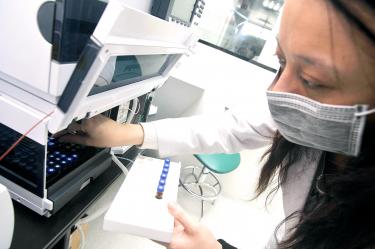Taiwan has neither broken any WTO rules nor breached any commitments by failing to go ahead with a plan to establish maximum residue levels for the livestock feed additive ractopamine, of which the organization was first notified in 2007, a WTO official said.
“The point of notifying the WTO about such measures is transparency and peer review, so that other governments know what measures are being taken and why, and to allow them to comment,” the official, who asked to remain anonymous in accordance with WTO staff rules, said in an e-mail reply to an enquiry from the Taipei Times on Friday.
As part of a plan to pressure Taiwan into lifting its ban on imports of US beef containing ractopamine residues, Washington has been urging Taiwan to honor WTO commitments made in 2007 by the then-Democratic Progressive Party (DPP) government, which it said was based on a notification sent to the WTO on Aug. 16 of that year.
In defense of its plan to partially lift the ban, described by the US as a “stumbling block” in bilateral relations, President Ma Ying-jeou’s (馬英九) administration has adopted a similar position to that of the US, saying the issue is a problem caused by the DPP in 2007 and would render Taiwan a “unreliable trading partner” if the ban continued.
However, the view expressed by the WTO official on the policy reversal in 2007 explicitly contradicted that position.
According to WTO documents, the then-DPP government notified the WTO that Taiwan intended to adopt maximum residue levels for ractopmaine for the muscle, fat, liver and kidney of cattle and pigs, in line with the draft maximum residue levels recommended by the Codex Alimentarius Commission, with a provisional proposed adoption date of Aug. 22, 2007.
Following domestic protest against lifting the ban, the DPP government submitted an addendum to the notification dated Sept. 5, 2007, to the WTO, saying the date on which the maximum residue levels would come into force “has been delayed until a time to be decided at a later date.”
Taiwan had the legal right to decide not to proceed with planned changes in food safety regulations, a decision of which the WTO was informed, and was not in violation of any rules for not implementing the notification, the official said.
The official explained the nature of notification measures used to require WTO members to implement transparency obligations under the Agreement on the Application of Sanitary and Phytosanitary Measures, also known as the SPS agreement.
The SPS agreement allows WTO members to set their own level of sanitary and phytosanitary protection in relation to quarantine and food safety, but also requires that countries make their rulemaking process transparent by notifying the WTO “well before the entry into force of relevant measures.”
The procedural step-by-step manual, a practical guide for governments to facilitate the implementation of transparency provisions in the SPS agreement, recommends that a standard time limit for comments on notification of at least 60 days be allowed before a measure is finalized for adoption.
Considering the nature of the notifying measures, a WTO notification is not the same as a WTO commitment, the official said.
Under the SPS agreement, countries are also required to make available the scientific basis for specific phytosanitary regulations to interested parties upon request.
“Since this is a notification about allowing ractopamine [but within set limits], by withdrawing its measure Chinese Taipei might find itself having to explain to other members why it is continuing with the ban,” the official said.
According to a WTO Trade Policy Review of Taiwan, Taipei informed the organization that the government was in ongoing consultations with a view to formulating a ractopamine management policy as various stakeholders hold different opinions and farmers particularly are strongly opposed to establishing maximum residue levels on ractopamine.
In response to concerns expressed about the issue at an SPS committee meeting in 2008, Taiwan has said that the use of ractopamine is forbidden by many WTO members and that the Codex Alimentarius Commission had also been unable to reach a final decision on MRLs for ractopamine, the trade policy review showed.
Source: Taipei Times - 2012/03/18





















